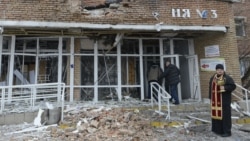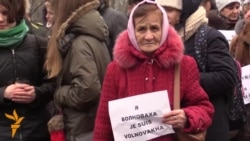Ukraine Honors Victims Of Volnovakha Bus Massacre
Thousands of people joined marches across Ukraine on January 18 to honor the 12 people killed on a bus near Volnovakha in eastern Ukraine five days earlier. Many held placards stating "Je Suis Volnovakha." Kyiv blames the attack, the bloodiest single incident in several months, on pro-Russian separatists.
From RFE/RL's News Desk:
Fighting between government forces and pro-Russian separatists in eastern Ukraine continued on January 19 amid conflicting claims over the situation at the bitterly contested Donetsk airport.
Reports say sporadic explosions were heard around the airport on January 19, when Orthodox Christians in Ukraine and Russia celebrate Epiphany, but that the violence seemed to be at a lower level than in previous days.
The Ukrainian military says the rebels had shelled government positions and residential areas at least 35 times since 6 p.m. local time on January 18.
It also claimed Ukrainian troops had retaken almost all parts of the ruined airport lost to separatists in recent weeks.
But a separatist leader, Aleksandr Zakharchenko, told a news conference that "all the Ukrainian Army's attempts to take the airport...have failed."
Russia and Ukraine traded accusations over the recent fighting. Vladimir Putin's spokesman claimed that Ukrainian President Petro Poroshenko rejected a peace plan proposed by the Russian president in a letter on January 15.
In a statement early on January 19, Ukraine's Foreign Ministry urged Moscow to sign a timetable for implementing the portion of a September 5 cease-fire deal that called for the withdrawal of foreign forces and heavy military equipment from the region.
Here is today's situation map of eastern Ukraine by the National Security and Defense Council:
Oil Price Plunge Drags Down Russian Economy: EBRD Bank
London, Jan 19, 2015 (AFP) -- Russia's battered economy will shrink by a far worse-than-expected 4.8 percent this year, as plunging oil prices add to fallout from the Ukraine crisis, the EBRD development bank forecast Monday.
The London-based European Bank for Reconstruction and Development (EBRD) sharply revised its September prediction for a 0.2-percent contraction for the economy of the key oil producer in 2015.
"A sharp fall in the price of oil has piled pressure on an already fragile Russia, and is hitting growth in energy exporters and other emerging nations with close links to eastern Europe's largest economy," the EBRD said in its economic outlook for the bank's investment zone.
Oil prices have slumped by almost 60 percent since June, hit hard by global oversupply, the strong dollar and weak crude demand arising from the stuttering world economy.
Russia's economy is also buckling under the weight of Western sanctions over the Kremlin's actions in Ukraine -- which remains plagued by unrest -- and tit-for-tat sanctions imposted on the West in response.
Russia has strongly denied sending weapons and troops into the war zone despite witness claims to the contrary.
At the same time, Russia's economy has been plagued by the tumbling value of its ruble currency, separate data showed Monday.
Net capital outflows from Russia more than doubled in 2014 to $151.5 billion, prompted by the Ukraine crisis and the plunging value of the ruble, according to statistics from the central bank.
Russia in 2013 had already seen its high level of capital flight, a recurring problem for the country, reach $61 billion.
The outflow was accelerated by the payment of debts owed abroad by Russian banks and companies, which have had their access to capital markets cut by sanctions.
The EBRD added Monday that Ukraine's shattered economy is predicted to shrink 5.0 percent this year, down from September's forecast for a contraction of 3.0 percent.
That followed a 7.5-percent collapse in Gross Domestic Product in 2014.
"The Ukrainian economy remains in a particularly precarious state," the London-based institution said.
"In addition to the impact of the conflict in the east of the country, there is currently uncertainty about the volume and timing of international financial assistance."
The EBRD, founded in 1991 to help ex-Soviet bloc countries such as Russia and Ukraine make the transition to free-market economies and democracy, added however that some nations would win a boost from the tumbling cost of crude.
The bank's investment zone -- comprising mainly former communist nations across central and eastern Europe but which now includes also Turkey and emerging economies in north Africa and the Middle East -- was expected to contract by an overall 0.3 percent in 2015.
That was a major downgrade from the prior forecast for 1.7-percent expansion in the operating region that comprises more than 30 countries.
"Even this forecast is subject to considerable risks," cautioned Hans Peter Lankes, the EBRD's acting chief economist.
Those risks included the impact of any further large falls in the oil price, a further escalation in the Ukraine/Russia crisis, and any potential increase in uncertainty in the eurozone, according to Lankes.
Plunging oil prices were however expected to boost countries in central and southeastern Europe and in the south and eastern Mediterranean region, offsetting weak demand arising from eurozone uncertainty, the bank added.









